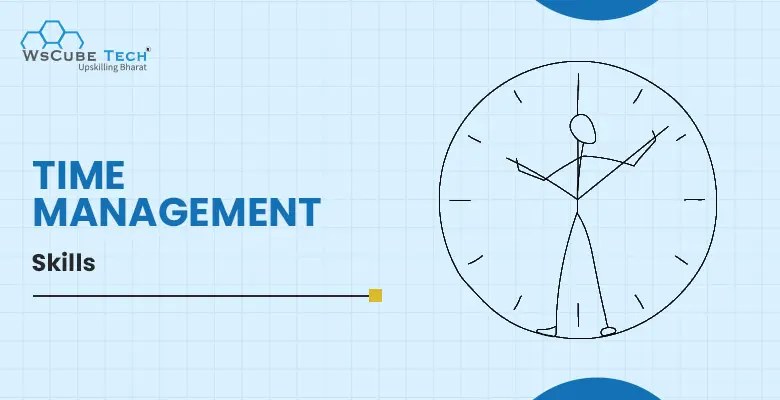“You can only manage time if you track it right.” – Spica’s Team.
Peter Drucker said you can only manage what you measure, and time is no exception. So, to improve your time management, track your time, analyze how you spend it and optimize it.
Individuals would benefit from improving their time management skills—it beats working under pressure. After all, if you don’t master your time, opportunities, work-life balance, and efficiency might slip through your fingers! Time management is easier said than done. As with most soft skills, it takes a lot of practice to get good at it.
While there are different ways to improve your time management skills, and this blog will teach you just what they are! Let’s get started.

What is Time Management?
Time management is a tactic to use your time efficiently and productively. It means organizing and planning how to divide your time between multiple tasks. You will get time to do everything you want without getting stressed out with good time management skills.
You can work effectually and prioritize your time to work out the important tasks first while following up with things that are not urgent yet important. Thus, you can focus your time and energy on things that matter the most and work smarter to increase productivity.
Time management synonyms include:
- Efficiency
- Planning
- Organization
- Optimization
- Scheduling
- Productivity
Upskill Yourself With Live Training (Book Free Class)
Importance of Time Management

Time management skills are essential to use time wisely and stop wasting it. We become more focused and productive when in charge of how we use our time. Productivity induces profitability; therefore, good time management can add to your bottom line.
When done well, time management leads to benefits like:
1. Improved Work-life Balance
Knowing how to effectively manage your time at work means spending time outside on things that matter most without being stressed about your to-do list.
2. Increased Productivity
You can get more done with the time you have. You can accomplish more in less time by strategically dividing your time between tasks. This helps you concentrate on the most important things to achieve your goals faster.
Also Read: Top 30 Essential Skills for Your Resume (CV)
3. Reduced Stress
Effective time management means better planning your time and meeting tight deadlines. Proper time management lets you prioritize your tasks and avoid getting overwhelmed, thereby reducing stress.
4. Effective Delegation
Those who know how to manage their time also learn how to delegate certain tasks so they have the time and ability to concentrate on higher-level tasks that can lead to more tremendous success.
5. Improved Resource Management
When you know how to improve your time management skills, you put more resources and effort towards achieving your short-term and long-term goals.

Top 12 Time Management Skills
Ready to improve your time management skills? Consider implementing these best practices.
1. Prioritize Tasks
Many people start improving their time management abilities by crafting a comprehensive bucket list. Although this list is helpful, start time management by thinking about what needs to be done first, and later prioritize your tasks by priority.
Take enough time to craft a list of priorities and cross them off as you go. Also, you can list these tasks based on how long you estimate they will take so that you feel accomplished when you complete them and use your time smartly.
2. Delegate Tasks
Delegating tasks is also an essential part of time management skills. Assigning work to your direct reports and colleagues, depending on their skills, abilities, and expertise, frees up time for you to work on other time-consuming or complex tasks, brainstorm strategies, and more.
When you decide to delegate, always set apparent exceptions for your direct report, give feedback, and show appreciation once the task is completed.
Also Read: Best Career Options After BCA in 2025
3. Set SMART Goals
Set Specific, Measurable, Achievable, Realistic, and secure goals within a time frame. Be particular about the outcomes you wish to achieve and allocate the time needed to reach them.
4. Establish Realistic Deadlines
Knowing how to improve time management as a work skill also means setting realistic deadlines for each task and sticking to them. While it’s okay to have shoot-for-the-stars deadlines and expectations sometimes, improving time management isn’t a perfect time to do so.
Rather, set a deadline before the actual due date so that you are ready for any challenges or hurdles that may arise.
5. Learn to Say No
Time is the most precious asset, and effective time management means getting comfortable saying no to tasks that aren’t your priority. Saying no on time saves you time to focus on more important things. Learn to set boundaries to avoid biting more than you can chew.
6. Tackle Your Most Difficult Task First
Consider addressing the most difficult tasks first to cross those items off before moving on to simpler ones that may need less time or energy. Eat the Frog technique centers around finishing your most dreaded tasks first. This is useful for procrastinators who often do their most minor tasks first and put off the bigger ones.
So, when improving your time management skills, move on to other, more manageable tasks once you have eaten the frog.
7. Use Technology to Help You Keep Accountable
Time tracking and daily time management tools are becoming more commonly integrated into the workspace. Time-tracking software lets you know how much it takes to complete individual time, whereas daily management software integrates your time-tracking results into your schedule. These tools allow you to create more realistic and accurate schedules and help you catch yourself before getting distracted or procrastinating for too long.
8. Avoid Multitasking
Multitasking is an enemy of productivity. Even though switching to and fro between tasks costs only a few seconds per switch, it can swiftly add up if you multitask frequently. Moreover, multitasking puts you at risk of making more minor mistakes more often and can negatively affect your working memory and ability to concentrate on essential tasks, which means things will start to fall through the cracks.
9. Limit Distractions
It’s easier to get distracted by emails, messages, or the urge to scroll through social media. These factors can get in the way of boosting your time management abilities. Avoid these common distractions by turning your mobile on Do Not Disturb or setting it out of reach.
Also, you can set up a particular timeframe during the day to check your email or other messages. Hence, you aren’t constantly distracted by incoming messages as you try to complete various tasks.
10. Find Your Productive Hours
Everyone has their most productive hours, and you must determine yours. For a few, these are in the morning before lunch; others are in the evening when most have left the office to commute home. Whatever the case, lean into when you find yourself most productive and use this time wisely.
11. Micro-break Between Tasks is a Must
A short break during your working hours reinvigorates you and eases your posture. It ensures optimum concentration when you resume your work. Moreover, if people around you know you will be available later, this limits interruptions.
12. Create a Plan
Lastly, craft a plan for approaching your list of tasks and action items. Calendar blocking, a time management technique, allows you to break your workday into sections based on what’s ahead. You will give everything on your task list a particular time slot in your calendar, and once it’s done, you move on to the next.
Also Read: Best Future Career Options and Opportunities in 2025
Benefits of Time Management as a Skill

Mastering time management skills is vital for completing the task, maximizing productivity, and achieving a better work-life balance. Some of the benefits about time management skills are:
1. Reduced Stress Levels
Efficiently managing time reduces the pressure of looming deadlines and overwhelming workloads.
2. Improved Productivity
Organizing tasks and prioritizing effectively leads to accomplishing more in less time.
3. Positive Reputation
Consistently meeting deadlines and delivering quality work fosters a reputation for reliability.
4. Clear Daily Goals
Setting clear objectives helps to stay focused and motivated throughout the day.
5. Improved Focusing
Prioritizing tasks enables better concentration and minimizes distractions.
6. Better Decision-Making
Time management provides space for thoughtful consideration, leading to more informed decisions.
7. Fast Goals Achievement
Structured time usage facilitates the timely completion of short-term and long-term goals.
8. Improved Quality of Work
Allowing sufficient time for tasks results in higher-quality output and attention to detail.
9. Boost Confidence Levels
Successfully managing time instills a sense of accomplishment and self-assurance.

FAQs on How to Improve Time Management Skills
Time management is organizing and planning how to allocate your time between tasks and activities. It allows you to work smarter, not harder, leading to greater productivity and reduced stress.
To manage your time effectively, employ the below strategies:
– Prepare a schedule to organize your tasks
– Set deadlines and clear goals for your activities
– Break down more significant tasks into smaller and more manageable tasks
– Eliminate or delegate non-essential tasks
– Use productivity techniques and tools
– Lessen distractions and set boundaries to maintain focus
– Regularly review and adjust your schedule depending on progress and changing priorities
Time management is important for several reasons:
– Increased productivity
– Reduced stress
– Improved focus and concentration
– Achievement of goals
– Better work-life balance
The best time management skills are subjective and may vary from person to person. However, one widely recognized practical skill is prioritization, which helps you identify and focus on essential and urgent activities. This ensures you allocate your time and energy to the right things.
Getting started on the road to well-managed time is easier than you may think. The 5 P’s help you get mentally organized: prioritize, plan, procrastinate, be productive, and be positive.
Free Courses for You
| Course Name | Course Name |
| Google Tag Manager Course | Affiliate Marketing Course |
| Semrush Course | Video Editing Course |
| Blogging Course | Email Marketing Course |
| Shopify Course | Photoshop Course |
Conclusion
We all have 24 hours a day, and time is ticking away second by second. We can’t save, store, or reuse it.
Whatever time management strategies you use, evaluate how they work for you. Do you have a healthy balance between work and life? Are you accomplishing the most important tasks? Are you investing enough time in your well-being? If the answer is no to any of these questions, reevaluate your time management tactics and transition to ones that work better for you. Successful time management skills lead to greater personal happiness, more accomplishments at home and work, and a more satisfying future.
Read more blogs:



